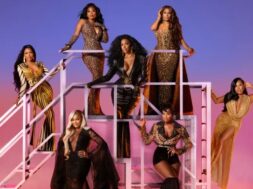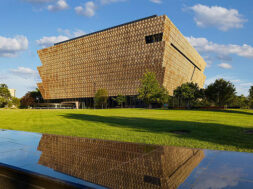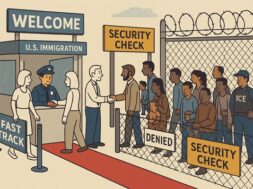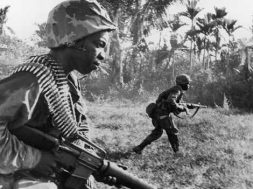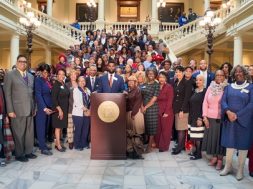
UNCF Hosts Town Hall Conversation Addressing Role of HBCU’s and Minority Serving Institution’s in Advancing Sustainability
By Edrea Davis – The tragedies caused by recent tornadoes, hurricanes and other weather disasters as well as the failing economy were used to underscore the urgent need to build green during the United Negro College Fund’s (UNCF) Institute for Capacity Building’s (ICB) Town Hall Conversation addressing the role of historically Black Colleges and Universities (HBCU) and Minority Serving Institution’s (MSI) in advancing sustainability.
More than 100 campus leaders representing seventy two-and four- year minority-serving colleges and universities from as far as Guam and Africa were on hand for the lively discussion – the opening session of the UNCF Institute for Capacity Building’s fourth Building Green Learning Institute taking place at the Hyatt Regency Capitol Hill in Washington, DC.
After greetings from UNCF ICB partners, five of the most prestigious leaders in the environmental arena addressed the role of minority serving institutions as well as individual roles of good citizens to make a contribution to greening America. The town hall conversation was moderated by Nia Robinson, environmental advocate in residence, Bennett College for Women.
The fact that many of the participants traveling to the Building Green conference were delayed due to unusual weather conditions across the country drove home the overall message that immediate action is needed.
William F. L. Moses, program officer at the Kresge Foundation, a major sponsor of the Building Green Initiative, expressed the dire need for minority serving institutions to join the effort to save the planet for future generations by greening their campuses. He gave impressive examples of completed LEED certified buildings, and talked about the programs funded by Kresge Foundation.
“I’m an evacuee of Gustav, Rita, and Katrina,” said Jerome C. Ringo, senior executive for Global Strategies, Green Port. Ringo highlighted the fierce urgency of change now. “The conditions are getting worse. Weather forecasters are expecting the summer of 2011 to be the hottest year ever,” he said.
David W. Orr, Ph.D., Paul Sears Distinguished Professor of Environmental Studies and Politics and Special Assistant to the President of Oberlin College, gave a witty but very poignant discussion of the deterioration of weather conditions. He talked about each individual’s moral obligation to do something now to save the planet for future generations. He also highlighted several steps already taken at Oberlin College and how organization’s need to work together.
The representative from the White House, John S. Wilson, Jr, Ed.D, executive director of the White House Initiative on historically Black Colleges and Universities, discussed the accomplishments in the Green arena already made under President Obama’s administration, and current initiatives that can help minority serving institutions green campuses including low interest rate loans and the use of Title One funds. Prior to joining the Obama administration Wilson was a board member at Spelman College spoke about his pride in being a part of the building of a LEED certified building on the Spelman campus.
Shemar Bibbins, political aid, Green For All, talked about their organization’s mission to cultivate the next generation of green leaders, especially in communities of color who have the most to gain from a clean-energy economy. Their Green For All College Ambassador program currently runs on ten historical Black Colleges and Universities. The Ambassadorship consists of expert trainings, a mentorship program, student-led green education workshops, and a semester long campus sustainability initiative created and carried out by the Ambassadors with support from students, faculty and Green For All.
The panel also addressed the need for religious leaders to join in the efforts by preaching and educating the public from the pulpit. Panelists added that those “prosperity preachers” can get in on the movement by looking at the economic opportunities created by Green Jobs and entrepreneurial efforts.
The town hall meeting was followed by a reception where UNCF President Michael Lomax addressed the audience. Other speakers included: Karl Reid, Ed.D. – Sr. Vice President of Academic Programs and Strategic Initiatives, UNCF, Michele D. Thomas, MD – CEO, Urban Farmer, and Clarissa Myrick-Harris, Ph.D. – Interim Executive Director, UNCF Institute for Capacity.
Led by Felicia Davis, UNCF ICB’s Building Green Initiative is helping UNCF member colleges and other minority serving institutions become stronger and more self-sustaining. Davis promised the audience three days of informative workshops, presentations and panel discussions.
The three-day conference will include presentations by the U.S. Environmental Protection Agency, Learning Laboratories, renewable energy options, and sessions on financing green building and best practices.
The purpose of UNCF’s Institute for Capacity Building (ICB), the UNCF unit that is offering the Building Green at MSIs Initiative, is to strengthen the overall capacity of its 39 member private historically black colleges and universities (HBCUs). The Institute for Capacity Building was launched in 2006 with the purpose of developing higher admission, retention and graduation rates, effective fundraising and fiscal management operations and opportunities for innovative teaching and learning across its network of colleges and universities.
UNCF is the nation’s largest and most effective minority education organization. To serve youth, the community and the nation, UNCF supports students’ education and development through scholarships and other programs, strengthens its 39 member colleges and universities, and advocates for the importance of minority education.



